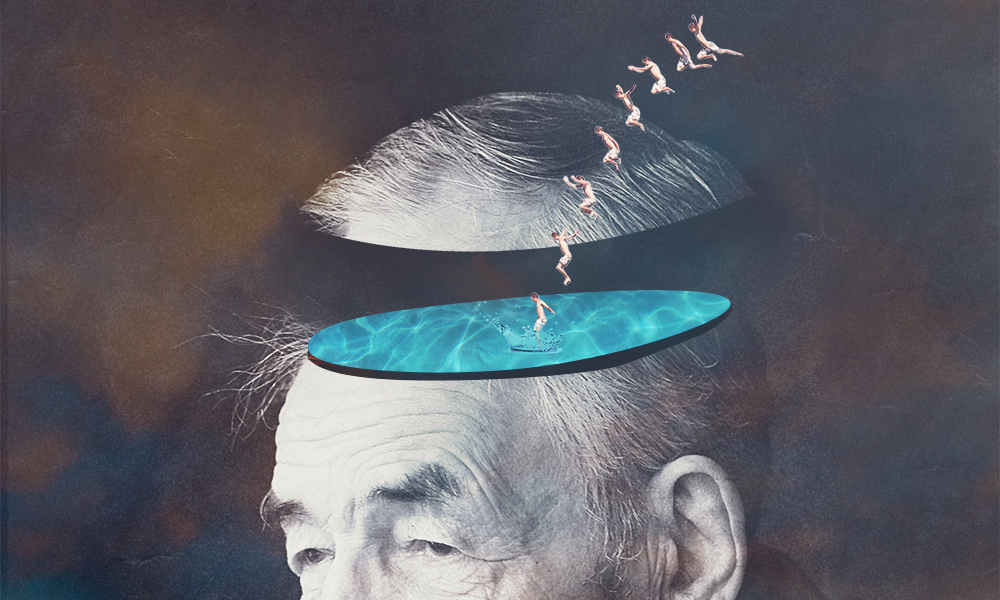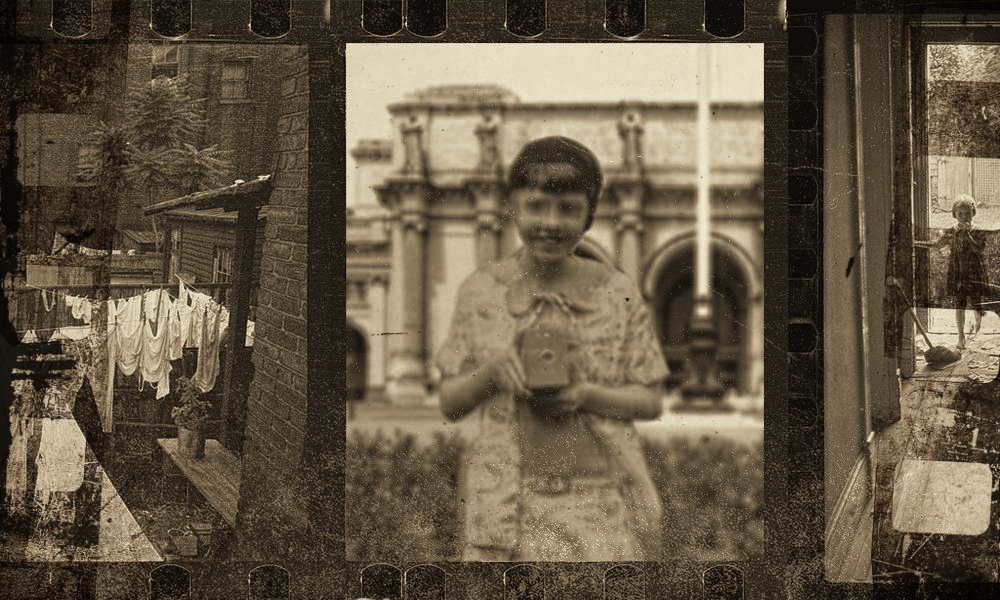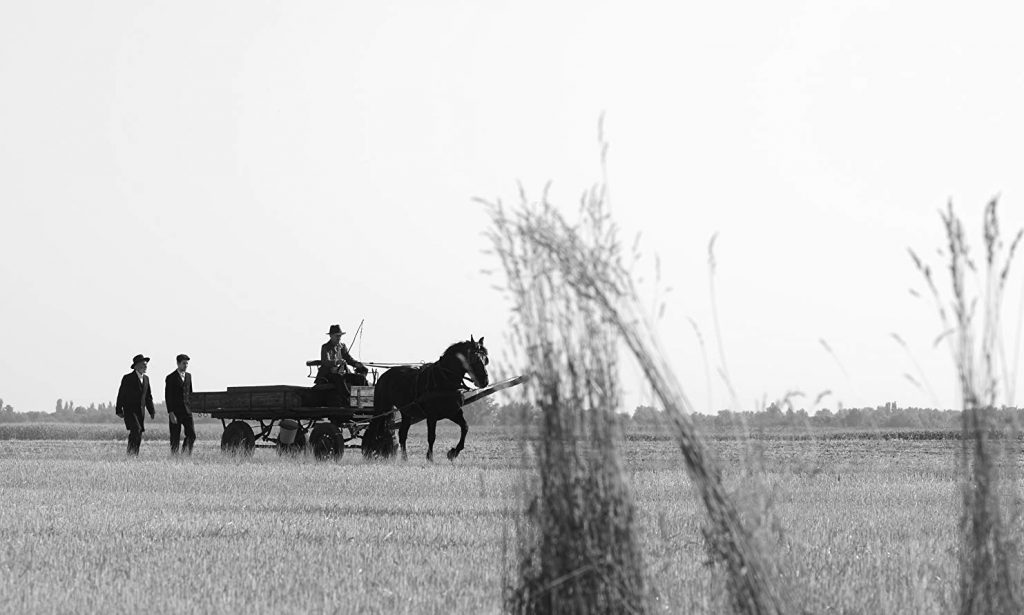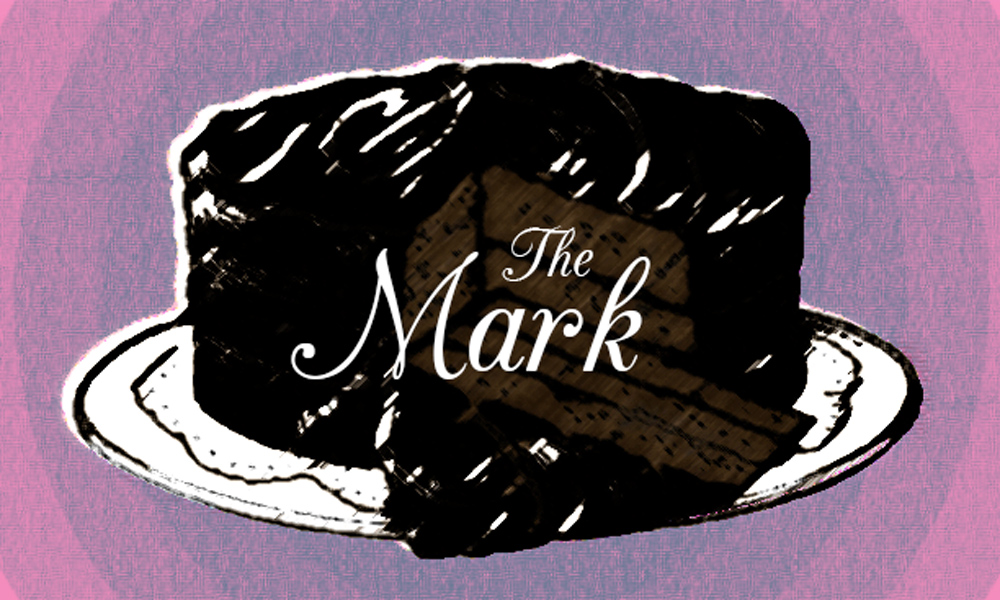Simcha was the man who sold air from the Holy Land, not to be confused with those unimaginative con artists who sold oil from the Oily Land or water from the Dead Sea. One summer, he tried his luck selling oil; he picked enough olives from public gardens and private lawns to make a few bottles’ worth. As for selling water, he filled up bottles from the tap in the kitchen sink and added plenty of salt to make it authentic, as if it had been siphoned directly from the Dead Sea. These projects all proved too much work, too risky and too costly. Air was everywhere, he didn’t need anybody’s permission to bottle it, and most importantly, it was free.
Like the Mediterranean Cabernet Sauvignon of the Judean Valley, Simcha’s product came in boutique bottled packaging designed for the sophisticated customer with a discerning palate. He made little sticker labels for each bottle with his daughter Lali’s help. On each label, she drew an old, bearded man blowing a gust of wind, apparently a Greek god of some kind she studied in school, but Simcha thought he looked more like the Miser, the owner of the falafel place down the street, who enjoyed quoting biblical verses from Kohelet and sold half a measly pita for a small fortune. Together, Simcha and Lali polished the empty bottles with a rag, placed them side by side in a blue trolley and went out in search of tourists willing to buy air.
With his keen eye and sixth sense—a tingling sensation in the presence of the very wealthy—Simcha zeroed in on them from all the way across Dizengoff Street,
window-shopping. Two middle-aged American tourists, Jewish of course, and proudly patriotic with their “I heart Israel” shirts, probably with plans to marry their daughter off to an El Al pilot. Simcha got closer, innocently pulling his trolley along.
He could tell they were rich by the shine of their teeth. The husband’s wallet practically bulged out of his back pocket, plump as a peach. The man was red-faced, sweat pooled under his arms and made his turkey neck shine. The young wife, petite and dressed impeccably in white linen, was star-struck by a golden necklace in the window, playing with the diamond ring on her finger. Her hair, like the necklace, was golden. Although Simcha knew that her hair was not really spun of solid gold, it did give her a certain advantage. If in dire need she could cut off her hair and sell it to the highest bidder.
Simcha pulled his trolley along in the tourists’ direction, empty bottles clanking and clinking as he went, while Lali came over from the other end of the street, wearing her adorable dress spotted with starfish and sea snails, holding Moshe Dayan, the
one-eyed cat, in her arms. Simcha reached the tourists, who were peering at the glittering display in the front store window of Zehava’s Jewelry and Judaica: silver goblets and mezuzahs, pearl necklaces, blueberry-size diamond earrings sitting snugly in a green velvet case. Lali stopped in front of Simcha, admiring the bottles of air arranged in the blue trolley, while Moshe Dayan, curled up in her arms, groomed his grey fur, licking his forepaw with his quick, scratchy tongue.
“Mister sir,” Lali said, in the English they had practiced, “what do you have there?”
“Oh this? I’m only selling air.”
“Air? Why would anyone buy air?”
“This isn’t just any air. It’s very special. I’ll tell you a secret.”
Lali leaned in, and her father whispered gibberish in her ear. The tourists stopped and were staring now, dumbstruck by the interaction.
“I want ten of them!” Lali said.
“Ten? You couldn’t afford even one, my dear.”
“I can sell my cat, Moshe Dayan. Please.”
“This cat? He only has one eye. How much could he possibly be worth?”
The tourists looked mortified. The golden-haired wife clicked her tongue in disapproval as if it was unkind to remind the cat that he only had one eye. “Visually challenged feline is the correct term,” Simcha imagined her saying at an annual dinner for the charitable foundation she set up in support of dim-sighted kittens. The rich couple stopped to stare and now came the final blow. Lali went over to the tourists, the visually challenged feline in her arms, stared at her shoes and gave her speech.
“Hello, ladies and gentlemen,” she said. “I offer you my cat, Moshe Dayan, to purchase. He may only have one eye, but he doesn’t break things often. He is named after the famous Israeli war hero, who lost his eye in the struggle for our nation’s freedom.”
“We can’t buy your cat, honey,” the American lady said. “It wouldn’t be right.”
Lali hid her face in the cat’s fur.
“What’s in them anyway?” The American man said.
“Oh, in these?” Simcha said. “Nothing. Only air.”
“Then, why does she want them so bad?” the husband said. “How much are you charging?”
“Fifty shekels per bottle, for the usual customer. For the girl, I will give a very special discount, 50 percent off! Now, only twenty-five shekels per bottle.”
The wife looked at her husband, raising one eyebrow like a golden bow. The husband looked annoyed, drumming his fat fingers on his thighs. It’s nothing, she mouthed. The husband looked at his wife, and Simcha imagined him trying to calculate the cost of refusing to buy the bottles of air. Would they fight for the rest of their holiday? Would she give him the silent treatment and act as if he did not exist? Would she leave him for a younger Israeli man who ran ultra-marathons and worked in tech, a man who bought bottles of air on a whim, just because, without thinking twice, because money meant nothing to him? The husband sighed, nodded wearily, accepting his fate with modest bravery.
“How many bottles would you like, honey?” the wife asked.
Lali stayed with simcha in his tiny apartment on Bugrashov Street on Fridays, and that was only because her mother wanted to get drunk in a dimly lit bar downtown, in Florentin, where it was too dark for the men to see her wrinkles and sagging skin. Simcha’s ex-wife got custody for six days, while he only got one. She worked at a beauty parlor on Ben Yehuda Street, which wasn’t exactly Wall Street, but the judge wouldn’t listen. Apparently, Simcha wasn’t as financially stable. It’s all castles in the air how you make a living, said the judge, waving an arthritic hand, casually proclaiming his sentence of doom. On Fridays, after selling bottles of air to American tourists, Simcha took Lali to Katsanelson’s ice-cream factory and they picked out the misshapen popsicles, the mistakes in production, which were free, and then they went to Independence Park and played with other people’s dogs. They had their tradition of going out to eat falafel at the Miser’s after a big sale of air and then visiting the Dolphinarium.
Simcha and Lali split the money from the sale of bottled air. He kept half and handed her the other half, which she tucked in a tin box with a peeling castle floating in the clouds on the cover. Her mother didn’t know about the arrangement.
The Miser’s Falafel was a tiny place, so small it could fit only the Miser himself. He hired no other employees since he was too cheap to pay them their wages. Simcha and Lali joined a long line of customers who were waiting for their falafel. The Miser took his time, frying the chickpea balls in his bubbling, sizzling grill, where the oil, possibly as old and bitter as the Miser himself, was never replaced.
“Hey, king of the falafel,” Simcha said, “I want two pitas with falafel, hummus, tehina, pickles, salad and cabbage. Don’t leave out the spicy mango amba sauce!”
“Did you get a haircut?” Lali asked the Miser.
“There is nothing new under the sun,” said the Miser, quoting his favorite passage from Kohelet. His hair did look different, lopsided, shorter on one side as if he had gone to the barber’s and changed his mind halfway through. There was no way, Simcha thought, that the Miser would ever pay full price for a haircut.
“Can I have one extra falafel?” Lali asked, as she always did. “I’m hungry.”
“All the rivers flow into the sea, and yet the sea is not full.”
“Come on, Miser,” said Simcha. “Give my daughter one extra falafel.”
“What profit has man in all his toil under the sun?” said the Miser. “It will cost you. I have my reputation to consider.”
The Miser had known Lali ever since she was “this big”—he always mimed her size by lowering his hand to the ground—but even so he refused to give her an extra falafel. It was a matter of principle and Simcha respected him for his steadfast miserly ways but cursed him for the very same reason. As usual, Simcha and Lali split the money from the sale of bottled air. He kept half and handed her the other half, which she tucked in a tin box with a peeling castle floating in the clouds on the cover. Her mother didn’t know about the arrangement.
“If your mother asks,” Simcha said, “tell her I gave you some pocket money.”
“Okay,” she said, licking her fingers.
“Your bat mitzvah is coming up,” he said, as he did every time they met.
“No, it’s not. Not for another”—she counted using the fingers on both hands— “seven years.”
“That doesn’t mean we can’t start celebrating. Where do you wanna go today?”
They went to the Dolphinarium, as was their tradition. Years ago, the Dolphinarium used to be an aquatic zoo, where people paid to watch dolphins perform tricks, flips and other acrobatic feats in the air. At the center of the arena was a circular pool, where the dolphin trainers stood on artificial islands, wearing white shirts and serious expressions, and tossed shoals of mackerel, schools of herring and families of sardines for the dolphins to catch in the air. The crowds would come and applaud the talented dolphins, but pretty soon it became unfashionable because the animal rights groups protested every day by the entrance. Parents stopped coming and bringing their kids, who started seeing the cruel side to the enterprise, and the Dolphinarium was shut down and transformed into a nightclub. The club—which kept the enormous pool at the center, as well as the arena-like structure, and played electronic dance music until dawn—was destroyed in a suicide bombing years ago, during the Second Intifada, before Lali was even born, but everyone still called the wreckage the Dolphinarium.
PRAISE FOR THE MAN WHO SOLD AIR IN THE HOLY LAND
The Man Who Sold Air in the Holy Land is a wonderfully crafted, touching story about a failed father whose only way to sustain his young daughter is by means of his overdeveloped imagination. The story resurrects the traditional diasporic-Jewish character of the Luftmensch, the “air person,” whose entire existence and livelihood are suspended in the air. In a creative twist of irony, the writer chose to place that Luftmensch in Israel, the old-new homeland that was supposed to negate the uprooted diasporic existence and solve “the Jewish problem” by returning the Jews to the ground, culturally as well as financially. The story is distinguished by its magical, bittersweet tone; cinematic qualities and fine balance between humor, sorrow and compassion.
Simcha and Lali would go watch invisible dolphins do their tricks, which was the best and cheapest entertainment around. There was a secret way into the Dolphinarium, if you followed the wave-breaker boulders towards Yaffo, and slipped through a hole in the fence, you could climb onto the graffiti-littered remains of the arena. The pool, which had been long dry, was painted with all kinds of sea creatures—lionfish, zebrafish, catfish. Every combination of a fish and another animal was represented. Even combinations of inanimate objects and fish were there, like swordfish and hammer-sharks. The bottom was cracked and dusty, scattered with plaster debris, and the seats of the arena that surrounded the pool on all sides were long gone, too. Simcha and Lali sat in their reserved seats, on the ground, at the center of the empty pool, where their voices carried and echoed in the empty space.
“Look at that one!” Lali said, clapping her hands. “It’s so fast!”“What a fantastic swimmer, top-notch.”
“Nice flip!” Lali said.
“Would you stop feeding the dolphins, sir?” Simcha said. “That peanut snack is not healthy at all!”
“Don’t stick your head in its mouth!” Lali said.
“I wish I had a tail like that,” Simcha said.
The sun sank lower and lower in the sky, painting the cream-colored clouds shades of rosewater, just like malabi, Lali’s favorite dessert. The attraction of an empty arena, so dazzling and full of hidden promise in the daytime, slowly faded as it grew darker. Lali got sleepy, her head rested on Simcha’s shoulder, and the dolphins around them were invisible once more. Pretty soon, she would be too old for this and he would have to take her to see real dolphins in real aquariums. The arena was completely deserted, except for a seagull that perched on a rusted metal beam. It flapped its wings and left, too. Simcha scooped Lali up and hung her over his shoulder, like a sack of potatoes, and they made their way home.
After he returned Lali to her mother, Simcha sat in the living room staring at the pile of unpaid bills on the table. Letter upon letter upon letter, all with red warnings, towering to an impossible height. The electricity and water were going to be shut off soon. He couldn’t have Lali sleep in here when it happened, it would be too terrible. No hot water for a shower, no television. She would be miserable. She would tell her mother and then he would never see her again. The judge would grant her mother full custody. He could just picture the courtroom. And what exactly is your occupation, sir? the lawyer would ask him. Are you a salesman? I am a sommelier of air, he would reply grandly, specializing in oxygen from the Holy Land.
Everyone in the room would laugh, and Lali would be taken away. He’d never see her again. She would forget who he was, pass by him on the street without a second glance, as if he were completely invisible, like one of the dolphins in the Dolphinarium.
When Simcha returned home, there was a notice on his door telling him he had been evicted for not paying rent for months. Inside his apartment, his closet was overturned, clothes hung out of drawers. His bottles of air were gone.
He sat on the stoop of his house, on the first floor of his apartment building, with the trolley of empty bottles. Jews and gentiles passed by, and he played a game of Duck, duck, goy! When he got bored, he called out to potential customers, trying to sell his air. Selling the freshest air, straight from the Holy Land, step right up and get your air, you won’t regret it! It’s flying off the shelves right now. Who doesn’t need air? Don’t miss this opportunity to get two for the price of one! Air, everyone, air! Someone walked by and shouted, we’re breathing it for free, you donkey! It wasn’t any use. Without his daughter, he was nothing. He couldn’t even sell air to the most gullible American tourist.
That Friday, he arranged to meet Lali at the reception room of the Hilton, wearing his only suit, a bright flamingo-pink color. Lali dressed up in her Audrey Hepburn costume from Breakfast at Tiffany’s, another favorite of theirs. When she entered the hotel, wearing a faux fur shawl, satin dress, doll shoes and a plastic tiara, he bowed and kissed her hand, calling her My Lady. The hotel served a buffet lunch of pancakes doused in golden syrup, mountains of raspberries, strawberries, blackberries, plums in ice, honey dripping off the comb, clusters of granola and cut almonds, overnight oats and century-old wine, rhubarb and apricot crumbles with scoops of vanilla ice cream, feta cheese and cream cheese, coffee, tea, grapefruit juice and a meter-tall, edible white-chocolate centerpiece in the shape of the Wailing Wall, complete with tiny marzipan figurines of praying Haredim. They heaped their plates and ate it all, speaking in their assumed roles. Pass the marmalade, darling. Delightful crumpets! Have you tasted this scrumptious Scandinavian smoked salmon, My Lady?
Simcha waved the waiter over. He was a tall man with silver hair parted to the side, dressed in a dark-velvet suit jacket, a blue-and-white flag pinned to his lapel. Simcha always found it hilarious and grotesque when Israelis dressed up. There should be a law against it. Unless they were professional actors or perpetrating an elaborate scheme that required a disguise, it was ridiculous and downright offensive for Israelis to wear anything but flip-flops and swimming shorts. They weren’t fooling anybody. The waiter looked like some kind of sabra version of the mythological British butler.
“Jeeves, old chap, we’d like one malabi, two spoons,” Simcha said. “We want all the toppings, and don’t skimp out on the rosewater!”
The milk pudding malabi came in a little glass cup, topped with sickly sweet rosewater and sugar syrup, heaped with pistachios, crumbled peanuts and flakes of coconut. Simcha and Lali clinked spoons, like honorable adversaries, and battled for dominance over the dessert. It was gone in thirty seconds. Lali licked her lips, bright red from the rosewater. When the time came to pay, Simcha told the waiter to put it on his room tab, and drew a number in the air, three-oh-one.
“I’m afraid we don’t do that, sir,” he said.
“I seem to have misplaced my wallet. If you would be so kind to put it on my room tab, I will make sure to take care of it.”
“That’s not possible, sir. We take cash or card.”
“Come on,” Simcha said. “Just this once. Do it for the girl.”
“Sorry, sir. That’s not our policy.”
“Damn it! Just do it.” Simcha slammed his hand down on the table. He wiped the sweat from his brow.
“Daddy, here,” Lali said. She placed the tin box on the table, with the peeling castle in the clouds on the cover. Inside was her share of the profit from selling air to the American tourists last week.
Simcha got up from his chair, grabbed the waiter by his velvet collar. “Are you going to let me, a grown man, take money from my own daughter?” He let his hands hang there. Then, he patted the waiter’s chest, once, twice. “I’m sorry, so sorry.” He sniffed. They paid using the money in Lali’s tin box and left the hotel.
The next week, and the one after that, Lali’s mother refused to bring her over, perhaps because she heard some version of what had happened at the hotel. She probably thought he was using their daughter to make a profit. He could hear her self-righteous voice in his head. “Simcha, you should be ashamed of yourself. This is the last time you treat our daughter like a walking ATM card.” But it was just a game, a bit of play-acting that Lali loved and it never really hurt anybody. Simcha spent his time sleeping on the couch and hatching plans that he never acted upon. One plan was to steal Lali in the middle of the night, to hitchhike to the airport and board a flight to Zanzibar as stowaways in the cargo section. He could picture them flying through the air in the plane’s belly, with all the dogs barking in their cages nearby. They would open a few oversize suitcases and eventually find a delicious meal that someone had managed to sneak past security. They would eat someone’s homemade roast and potatoes, give the scraps to the dogs, who were whining and howling like crazy. They would live on a remote island, eating coconuts and training monkeys to fish for them. They would grill the fish and use their bones to pick their teeth, leaving the scaly skin for the monkeys, forming a perfectly self-sufficient society.
The next week, when Lali still hadn’t come, he headed to the Dolphinarium on his own. The arena was gone. The construction crew’s trucks had come by and demolished whatever remained, completely erasing it, as if it never existed at all. All that was left were a few blocks of stone and plaster, fragments of the painted pool. He picked up one of the pieces from the pool, on which a small, green fish was chasing after a scrap of kelp, and put it in his pocket. He felt like that fish, lost in the big sea, always chasing after scraps, getting tossed here and there by the waves, pushed to the side by the great white sharks and beluga whales, watching his small kelp daughter drift away from him. It was almost like the plot of that movie Finding Nemo, except that fish lived in an anemone. He imagined taking that one piece of painted rock he had found and multiplying it, using it to build a castle in the air, hovering right over Sheinkin Street, at the heart of Tel Aviv.
The castle would be made up of hundreds of thousands of painted tiles, with all the sea creatures in the world, and in the middle of the living room would be a huge aquarium with stingrays and dolphins. Lali would have her very own room and a waterbed, and he would teach her to love sushi.
When Simcha returned home, there was a notice on his door telling him he had been evicted for not paying rent for months. Inside his apartment, his closet was overturned, clothes hung out of drawers. His bottles of air were gone. He stumbled outside to Bugrashov and saw that his furniture and belongings were tossed all over the street. His trolley was being hauled off by two teenagers, one of them sat inside it while the other pulled. A man with crumbs in his beard was trying on one of Simcha’s jeans jackets. He saw his bottles of air shattered in the green dumpster behind the terrible kosher Chinese fusion restaurant that served Kung Pao latkes, Peking kugel and General Tso’s knish. Once, he ordered their famous Fortune Cookie Hamantaschen, and the note inside read: Don’t worry about money. The best things in life are free.
Simcha sat on the steps of his former home as people wandered by and took what they wished. In his pocket, he still had the piece of painted rock. A kid in baggy jeans and an oversize T-shirt rolled by slowly on his skateboard, looking oh-so-cool eating a slice of pizza and flicking his long, blonde hair back to get his bangs out of his eyes. Simcha asked him if he ever considered donating his hair to charity, and the kid gave him the finger. In the afternoon, Lali came by on her way back from school and sat next to him on the steps. Ever since the Second Intifada bus bombings years ago, he made sure Lali always walked home, never took public transportation. It was the one thing Simcha and his ex-wife agreed upon. Lali took off her ocean-themed school bag, which had pictures of octopi, whales, crabs and seahorses on it, and sighed, sounding older and wiser than her years.
“Why is all your stuff on the street?” she asked.
“I’m having a yard sale.”
“Cool! Can I buy anything?”
“Sure. What would you like?”
“How about this shoebox?” She held up a washed-out piece of cardboard from the street, which wasn’t even his.
“That’s too precious,” he winked at her. “I’m not sure I want to part with it, actually.”
Lali brought him back to her house on Ahad Ha’am Street. Her mother was still at the beauty parlor. Simcha searched for his face in the photographs hanging on the walls and resting on cabinets and bedsides, but he wasn’t in any of them. Moshe Dayan was sleeping in an armchair in front of the television, one eye closed. The fishing channel was on. The floors were clean, the lights worked in every room, the shower didn’t have any hair in it, and the water from the tap was so hot it scalded his hand.
“Mom won’t be home for another hour,” she said. “When Moshe Dayan is alone, I always put the fishing channel on. It calms him down.”
Simcha and Lali sat in her room on the soft, blue carpet. Stickers of sea creatures were plastered all over her closet, and her bed frame was shaped like a wave. They listened to her sea-sounds playlist, which she put on every night before going to bed. The whooshing of the waves calmed Simcha. He placed the painted rock in the palm of her hand.
“Have you seen any dolphins around?” he said.
“A few.”
“Your bat mitzvah is coming up.”
Lali did not answer him. She was playing with the painted rock, making it swim across the carpet. “Where are you going to sleep, Daddy?”
“What do you mean? Anywhere. The Hilton, the Dolphinarium, a castle in the air. I have beds everywhere.”
“No, really,” she stopped playing and looked at him seriously, her forehead creased with worry.
Simcha wondered, for the first time, if, when they sold bottles of air to tourists, she was the one humoring him, rather than the other way around. He told her that there were plenty of things that he could do to make money to buy a new house, where they could be together. They could both join the circus and perform as a duo, jump through hoops of fire and glide through the air, held by invisible ropes. They could build a farm and raise chickens, paint their eggs golden and sell them for a fortune. They could collect strangely shaped rocks and sell them as rubble from the moon.
They could break open oysters and take their pearls. They could train parrots to talk like the dead at funerals, for those loved ones who had missed the final conversation. They would say things like, “you were always my favorite son,” or “I kept a secret portion of the estate for you,” or even, “I forgive you.” He kept talking and talking, even though he knew that she had stopped listening anyway, and soon, she would stop believing him, just like he had stopped believing himself.
Born in Jerusalem in 1994, Omer Friedlander grew up in Tel Aviv. His short story collection, The Man Who Sold Air in the Holy Land, and his novel, The Glass Golem, are both forthcoming from Random House. He is a Starworks Fellow in Fiction at New York University. His work has been awarded first place in the Sonora Review Contest, the Baltimore Review Winter Contest and the Tom Howard/ John H. Reid Contest.














